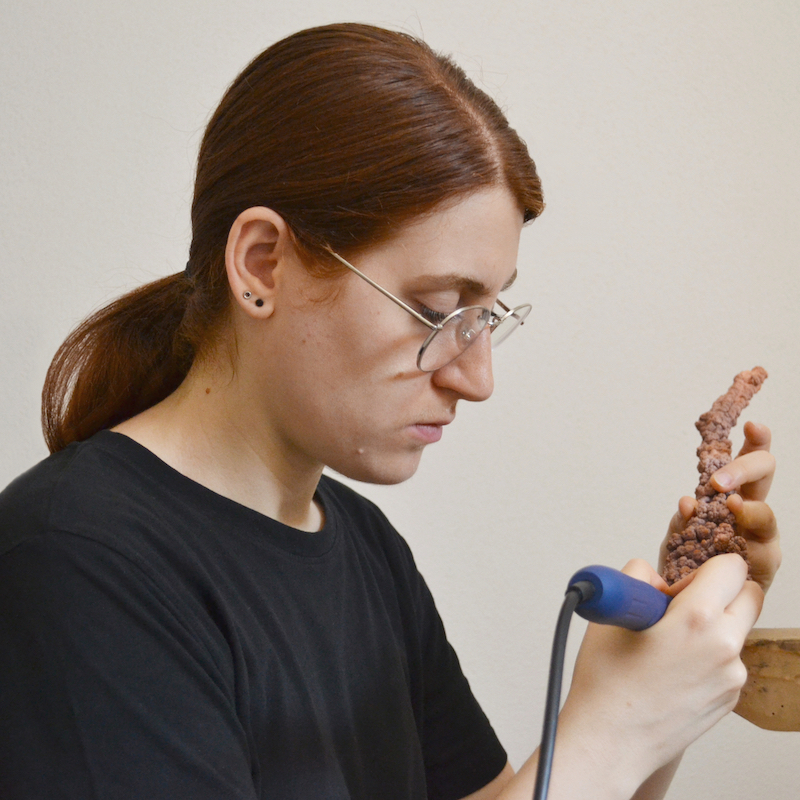
Lisa Marcolongo
Lisa Marcolongo is a contemporary jewellery artist and object designer living and working in Italy. In her works, she combines materials and techniques that can be attributed to traditional goldsmithing or industrial techniques, researching an aesthetic that is more natural and organic.
If you had access to all the powers, how would you improve the world?
Powers? When people think about power there is usually the idea of having something more than others with a tendency toward being the strongest, the smartest, the most beautiful and having something that makes the self feel better than others. So I would like powers that are not just for me, but I wish it for everyone: kindness and empathy.
What are the biggest sustainability challenges in your work and how are you addressing them?
In the field of goldsmithing, the concept of sustainability is much debated because there are issues related to the extraction of materials, conditions of workers, and environmental impact, but I notice more and more, especially independent goldsmiths, who are more interested in recycling and reuse of materials and looking for realities that support more ethical aspects.
Which conscious lifestyle choices are you making, and are you considering any new ones?
I think it is now obvious how much human beings are changing the environment, but I am also positive in thinking that each of us is really working hard to change. In my day-to-day life I’m more careful in my transfers because I walk a lot more or use public transport, or I decide in advance what to eat during the week to do the grocery shopping while avoiding waste, I don’t increase the heating or air conditioning temperatures too much. I know these are small gestures, but they are elements of everyday life. By getting in touch with the Steinbeisser project, I also started to questioning about food and the relationship I have with it. Very challenging!
What have you rebelled against in the past, and what are you rebelling against now?
Rebel? This is a difficult question because I have never been a rebel, but I am an observer. I observe everything, and I reflect, I like to listen to different opinions and understand different points of view. I like to inform myself. By observing and reflecting, it happens that one then changes one’s mind on issues, but never aggressively, never by bullying the other. True rebellion is made up of small gestures, kindness, listening and confrontation.
Do you need to be a rebel to enjoy your work?
I have difficulty with the term ‘rebel’ because of its meaning related to violence. My work is not violent, on the contrary it is very whispered and delicate. I like to think of it as a bubble suspended in time and space.
Do you use your own work?
Before presenting the spoons at dinners in Basel I had tried them out to see and feel the effect they would have, but I’m still more interested and curious to see how others interact with my work rather than myself.
Do you think cutlery can still be improved? If yes, in what way?
There is always space for improvement! I would like to work even more on the tactility of the spoons, on the sensations they can give to the body when held. I have some ideas I’m working on, but I don’t want to give too many spoilers!
What was the inspiration for your Steinbeisser pieces?
I was very impressed by the dictionary definition of the term biodiversity: “a system that includes the coexistence of living and non-living things in an ecosystem, that is, in a well defined area”. So I asked myself where do I live? What surrounds me? I live in a city on the edge of Milan, that exploded after the Second World War because so many factories had opened in Milan and people were migrating to be able to work, so a lot of houses, a lot of buildings, a lot of cement, a lot of asphalt. But the people who migrated were used to the countryside, to green, to open spaces, so there are a lot of parks and gardens. That why I tried to make natural and artificial elements coexist in my work.
Describe your work in 3 words!
Nature. Contrast. Home.
What kind of materials do you use and where do you get them from?
For Utensilia spoons I used waste materials, the wood collected from a park near my house that would have been thrown away because they were all branches that had come loose after a storm, and the copper that had been used previously for other works and experiments.
What has been your favourite dinner experience?
It’s not the place that’s important, it’s the people around me, friends and relatives that you may not have seen or heard from in a while. But as soon as you sit down at the table, even before the food is served, it’s as if no time has passed, and you spend the whole evening talking to each other.
What excites you about tomorrow?
Tomorrow is always a surprise! We need lightness, but not superficiality, and the courage to always throw ourselves into things with enthusiasm!